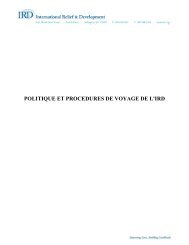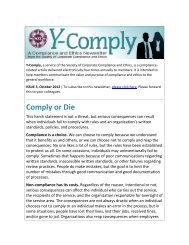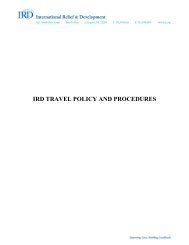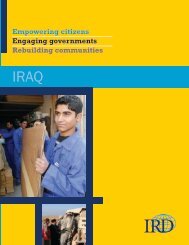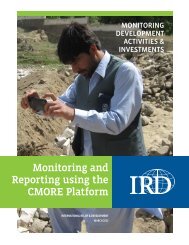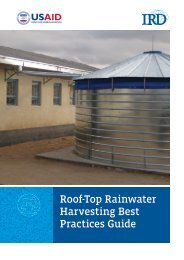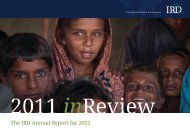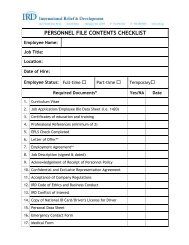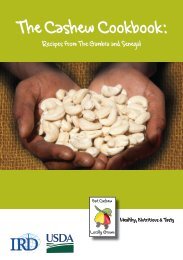2006 - International Relief & Development
2006 - International Relief & Development
2006 - International Relief & Development
You also want an ePaper? Increase the reach of your titles
YUMPU automatically turns print PDFs into web optimized ePapers that Google loves.
<strong>2006</strong><br />
Annual<br />
Report
Improving Lives.<br />
Ukraine<br />
Simferopol, Crimea, Ukraine — “The play I Love Life, about the stigma of HIV/AIDS and<br />
discrimination against its victims, really changed my life,” commented Ekaterina Synchishina,<br />
a senior at Taurus National University (TNU) in Crimea.<br />
“For the first time I began thinking about attitudes towards HIV-infected people,” she explained.<br />
“I suddenly imagined myself in the place of the heroine, infected by accident, experiencing the<br />
pain of betrayal and misunderstanding. After seeing the play, I realized how important it is to<br />
support people like her, and not exclude them from society.”<br />
The play, I Love Life, was written by Sergei Siplivy, a student at TNU. It is performed on the<br />
average of four times per month at schools, colleges and public events throughout Crimea. The<br />
play is part of the USAID-funded Reducing Stigma and Discrimination Associated with HIV/AIDS in<br />
Ukraine project, designed to create awareness of HIV/AIDS among the two million people who<br />
live in the area.<br />
“As a lecturer with years of experience, I know a great deal about HIV/AIDS,” said Valentina<br />
Efimova, a professor in the Department of Physiology at TNU. “But we have failed to help<br />
students not only stop fearing a person with HIV/AIDS, but also convince them that our attitudes<br />
affect the health, emotions and desire to live of those who are ill.”<br />
She praised the efforts of IRD and USAID for producing I Love Life and sponsoring other outreach<br />
activities that educate students and others about the stigma of HIV/AIDS and how destructive the<br />
discrimination can be for those infected. “In the beginning, the situation at the university was<br />
extremely difficult — not all of the students or teachers were interested in stigma and<br />
discrimination problems associated with HIV/AIDS. In my classes, I could only work with a very<br />
limited number of boys and girls. The play, I Love Life, helped change the situation.”<br />
“Do unto others as you would have them do unto you,” Efimova said about the impact of the<br />
play, “which showed how difficult a task it is to change false stereotypes about HIV-infection and<br />
AIDS, about people living with HIV/AIDS. It is so hard to break the myths that have existed for<br />
decades, and build compassion, care and support for those who are affected by this epidemic.”<br />
I Love Life tells the tale of a young girl stricken by AIDS through a blood transfusion; her<br />
boyfriend leaves her and she is shunned by her family and her schoolmates. She finally attempts<br />
suicide, due to her rejection by all of her loved ones.<br />
Top to bottom:<br />
TNU students perform I Love Life<br />
Play evokes strong reaction from<br />
Ekaterina Synchishina<br />
A transformed audience erupts into<br />
applause<br />
When the play premiered several months ago at TNU, spectators were spellbound by the story —<br />
many cried and had very strong emotional reactions — and the vast majority reported that their<br />
attitudes were changed by seeing the play, showing the power of the written and spoken word.
Dear Friends,<br />
Dr. Arthur B. Keys, Jr.<br />
President & CEO<br />
Cover, top to bottom and left to right:<br />
Central African Republic<br />
Indonesia<br />
Kenya<br />
Mozambique<br />
Niger<br />
Lebanon<br />
Serbia<br />
Armenia<br />
Afghanistan<br />
Cambodia<br />
Sri Lanka<br />
Iraq<br />
In <strong>2006</strong>, once again, millions of people<br />
suffered greatly from floods, earthquakes,<br />
war, disease and famine. IRD is working<br />
hard to help survivors of these disasters<br />
have a brighter long-term future.<br />
This past year we extended our reach into<br />
three new countries: Lebanon, Laos and<br />
Sudan; expanded our activities in Chad,<br />
the Middle East, the Caucasus and<br />
Gulfport, Mississippi; and received our<br />
first major grant — to help children survive<br />
— in Cambodia.<br />
Indonesia remained a major focus of IRD<br />
activity. Despite massive aid contributions<br />
and programs designated to help Aceh<br />
province, the main site of the tsunami of<br />
December 2004, that area is still far from<br />
completely recovered. IRD continues to<br />
repair water and sewer systems and rebuild<br />
roads, schools and health clinics. When an<br />
earthquake hit central Indonesia in May,<br />
IRD already had an office in Yogyakarta<br />
and was able to help survivors immediately.<br />
One of the brightest spots for IRD in <strong>2006</strong><br />
was the success of the USAID-funded<br />
Construction Trades Training Center<br />
(CTTC) in Jalalabad, Afghanistan.<br />
Established as a pilot project in September<br />
2005, the CTTC became a full-fledged<br />
center in March <strong>2006</strong>. By the end of the<br />
year, we had trained well over 1,000 men<br />
in various trades — almost none were<br />
working before the training and nearly all<br />
found work after completing the course.<br />
Construction companies are hungry for<br />
qualified tradesmen, and the CTTC<br />
program fits the bill.<br />
Not yet 10 years old, IRD is a young<br />
organization but growing fast. We are<br />
proud that we are willing to go to places<br />
others won’t — and we never forget why we<br />
exist: to reduce the suffering of the world’s<br />
most vulnerable groups and provide the<br />
tools and resources needed to increase<br />
their self-sufficiency.<br />
We could not achieve our goals without<br />
our staff, both at headquarters and in the<br />
field. They work from dawn to dusk, on<br />
weekends and long into the night to save<br />
just one child from disease, help just one<br />
family avoid starvation and train just one<br />
person to find a job. We look forward to<br />
the challenges that the future brings us, as<br />
we hope for a world that is peaceful, safe<br />
and prosperous.<br />
C.S. Lewis once wrote, “It will not bother<br />
me in the hour of death to reflect that I<br />
have been ‘had for a sucker’ by any<br />
number of imposters; but it would be a<br />
torment to know that I had refused even<br />
one person in need.” I know that all of<br />
us here at IRD agree that it would be a<br />
torment for us to know that we had failed<br />
to assist even one person in need, if it were<br />
in our power to do so.<br />
Dr. Arthur B. Keys, Jr.<br />
<strong>2006</strong> ANNUAL REPORT 1
About IRD<br />
IRD, a charitable, non-profit, non-governmental organization,<br />
focuses its operations in regions of the world that present social, political and technical<br />
challenges. IRD’s mission is to reduce the suffering of the world’s most vulnerable<br />
groups and provide tools and resources needed to increase their self-sufficiency.<br />
Our strategic goal is to accomplish our mission by implementing targeted, cost-effective<br />
relief and development programs that improve the lives of these vulnerable groups.<br />
Facts about IRD:<br />
• IRD was founded by Dr. Arthur B. Keys, Jr. in 1998.<br />
• IRD provided more than $130 million development assistance in <strong>2006</strong> to Africa,<br />
Asia, the Balkans, Latin America, the Middle East and the Newly Independent<br />
States.<br />
• Since 1998, IRD has provided more than half a billion dollars worth of goods and<br />
services in humanitarian assistance to vulnerable populations around the world.<br />
• Currently, IRD has program offices in 23 countries worldwide.<br />
• IRD provides cost-effective relief and development programs in five core sectors<br />
and special projects as needed.<br />
IRD works in collaboration with a wide range of organizations in the design and<br />
implementation of humanitarian relief and development aid programs, including<br />
U.S. and foreign government agencies, bilateral and international donor organizations,<br />
international finance organizations, faith-based organizations, advocacy groups,<br />
international and local NGOs, U.S. corporations and members of the U.S. Congress.<br />
Civil Society<br />
Equipping and Sustaining Community Life<br />
A healthy, stable community encourages citizen participation. IRD works at the<br />
ground level with local partners to promote planning, education and training to<br />
rebuild community life when it has been disabled by tragedy and conflict.<br />
Through our programs, residents leverage their ideas and commitment to their<br />
communities through community action committees. Working together, neighbor to<br />
neighbor, these programs encourage citizen participation, guide the distribution of<br />
humanitarian aid and identify their goals and priorities.<br />
To date, IRD has helped build the capacity of more than 50 local NGOs and 1,500<br />
community-based organizations worldwide. By helping people draw on their own<br />
capabilities and take ownership of their progress, IRD ensures that these communities<br />
are permanently equipped to function more effectively in the future.<br />
2<br />
INTERNATIONAL RELIEF & DEVELOPMENT
Economic <strong>Development</strong><br />
Providing Opportunities and Tools to Build Livelihoods<br />
Disaster relief programs are often temporary by design. The<br />
world often responds to devastation with generosity and<br />
compassion, but the funds and attention dwindle as the<br />
media’s attention moves to the latest global crisis. When relief<br />
efforts end, communities must be equipped to continue their<br />
recovery. Through economic development projects, IRD<br />
programs work to help generate business, train workers and<br />
create jobs that will sustain families and fuel growth.<br />
Small financial grants can provide the training and education<br />
necessary to build a trade; technical training and resources can<br />
help small and medium businesses gain access to world markets.<br />
IRD provides the resources to help people function productively,<br />
generating income and development through social<br />
loans, business loans, vocational training and employment.<br />
Food Security<br />
Improving Nutrition, Food Access and Availability<br />
Few problems have challenged the international community<br />
more than finding ways to better distribute the world’s agricultural<br />
riches so that food grown on one continent can provide<br />
sustenance to those in need on others.<br />
IRD is renowned for implementing creative solutions to bring<br />
food to the needy and empower communities to meet the<br />
nutritional needs of their people. By tapping the enormous<br />
resources of the U.S. agricultural community, IRD develops<br />
innovative programs to use U.S. Department of Agriculture<br />
(USDA) food commodity programs to meet nutritional<br />
needs overseas.<br />
IRD distributes thousands of metric tons of grain and<br />
soybeans to vulnerable regions across the globe, and produces<br />
nutritional snacks, noodles and biscuits for school meal<br />
programs and low-income families. Proceeds from selling U.S.<br />
agricultural surpluses fund de-worming programs in Southeast<br />
Asia and provide equipment and training for farmers in the<br />
Newly Independent States, while other initiatives assist in the<br />
development of agricultural cooperatives and expand markets<br />
across borders.<br />
Health<br />
Bringing Critical Health Skills and Services to Communities<br />
in Crisis<br />
When war and conflict leave hospitals destroyed and people<br />
without access to primary health care, communities continue<br />
to suffer long after the initial devastation.<br />
IRD programs are designed to rebuild local health care infrastructure<br />
and equip communities to meet the basic health,<br />
nutrition and reproductive needs of their people. Working<br />
with our partners, IRD has rehabilitated clinics and hospitals<br />
in war-torn regions from Serbia to Iraq, and supplied tens of<br />
millions of dollars worth of pharmaceutical supplies and<br />
medical equipment around the world.<br />
Designed to emphasize preventive as well as primary health<br />
care, our programs include training and health education<br />
outreach to raise public awareness of family planning,<br />
HIV/AIDS education, nutritional information and health<br />
management.<br />
Infrastructure<br />
Strengthening the Building Blocks of Communities<br />
A thriving community must, at minimum, provide its people<br />
with the basic services and resources necessary to support<br />
family life and make commerce possible.<br />
IRD programs have helped develop effective social services<br />
through collaborative efforts to improve roads, rebuild utilities,<br />
repair water and sewage systems, renovate schools and<br />
establish health facilities. We help children return to school,<br />
bring potable water to families and train local leaders to<br />
operate efficient sanitation systems.<br />
Beyond distributing food and critical supplies, we work with<br />
local and international humanitarian organizations to rebuild<br />
shattered lives and equip refugees with the shelter and tools<br />
they need to gain independence.<br />
Page 2, top to bottom:<br />
Crop evaluation by IRD, Azerbaijan<br />
Medical supply delivery to local hospital, Armenia<br />
Student at IRD-renovated school, Afghanistan<br />
Carpenters at vocational training classes, Iraq<br />
Page 3:<br />
Local man assists with water tank installation, Chad<br />
<strong>2006</strong> ANNUAL REPORT 3
Civil Society<br />
IRD believes that linking governance<br />
and civil society initiatives with<br />
other development programs produces<br />
greater results than the programs can<br />
achieve separately. Working with IRD’s<br />
Economic <strong>Development</strong>, Health, Food<br />
Security and Infrastructure programs,<br />
the Civil Society sector promotes strong<br />
community participation and advocacy<br />
and helps leverage local resources.<br />
Across all sectors, IRD seeks to<br />
empower informed citizens who can<br />
participate in the democratic process in<br />
areas ranging from HIV/AIDS awareness,<br />
to education and road building, to<br />
business development.<br />
IRD’s current Civil Society portfolio<br />
includes programs in vocational training,<br />
life-to-work education and community<br />
social work. These programs are<br />
implemented in vastly different contexts<br />
— Afghanistan, Indonesia and post-<br />
Katrina Mississippi — each with its own<br />
unique set of challenges. What binds<br />
these programs together, however, are<br />
IRD’s efforts to promote the empowerment<br />
of individuals and communities,<br />
as well as the long-term sustainability of<br />
its interventions.<br />
In Jalalabad, Afghanistan, IRD operates<br />
the Construction Trades Training Center<br />
(CTTC), a vocational training school. In<br />
the first year of the USAID-funded<br />
CTTC program, IRD graduated more<br />
than 1,000 students in intensive painting,<br />
construction, electrical wiring,<br />
plumbing and contractor programs.<br />
In the fall of <strong>2006</strong>, IRD initiated a<br />
short-term program that trains between<br />
30 and 40 tradesmen each week.<br />
Importantly, many of the students who<br />
enroll in the Center are individuals most<br />
at risk of engaging in insurgency activities.<br />
IRD ensures the long-term sustainability<br />
of the Center by providing a<br />
range of marketable construction and<br />
educational services to contribute to the<br />
reconstruction effort.<br />
IRD supports innovative approaches<br />
to life skills education in Indonesia<br />
under the USAID-funded program<br />
Decentralized Basic Education:<br />
Objective 3 (DBE3). In partnership with<br />
Save the Children, the Academy for<br />
Educational <strong>Development</strong> and The Asia<br />
Foundation, IRD is working to improve<br />
the quality of formal and informal<br />
secondary education by increasing its<br />
relevance to life, work and community<br />
development. To date, IRD has developed<br />
educational modules and provided<br />
training to over 1,300 district teachers,<br />
tutors and managers working with at-risk<br />
youth. IRD has also completed an<br />
educational assessment in Papua and<br />
Irian Jaya Barat to explore the possibility<br />
of expanding DBE3 activities into those<br />
provinces.<br />
IRD seeks to leverage its wealth of international<br />
experience in its domestic Civil<br />
Society programs on the Mississippi<br />
Gulf Coast though IRD US. Through its<br />
Gulf Coast Community Service Center<br />
in Gulfport, IRD provides comprehensive<br />
case management services to victims<br />
of Hurricane Katrina with funding from<br />
the Mississippi Department of Health<br />
and Human Services, the American<br />
Association of Retired Persons, the<br />
Reformed Church in America and<br />
Capital Groups. In addition to connecting<br />
victims with the services they need<br />
to begin rebuilding their lives, IRD also<br />
delivers financial and housing counseling<br />
as well as emergency preparedness<br />
seminars.<br />
4<br />
INTERNATIONAL RELIEF & DEVELOPMENT
Economic <strong>Development</strong><br />
IRD’s economic development<br />
sector addresses some of the most difficult<br />
issues facing small- and medium-scale<br />
farmers and entrepreneurs in vulnerable<br />
communities throughout the world.<br />
Since 1999, IRD’s Economic<br />
<strong>Development</strong> programs have strengthened<br />
the capacity and resiliency of<br />
individuals and communities to protect<br />
lives, respond to recurring disasters and<br />
strengthen human capital investment.<br />
The Economic <strong>Development</strong> sector<br />
focuses on four core areas:<br />
• Sustainable Agriculture, including<br />
support to agribusiness competitiveness,<br />
market linkage and value<br />
chain development in an environmentally<br />
friendly production and<br />
processing systems environment;<br />
• Livelihood Security;<br />
• Micro-Enterprise <strong>Development</strong>; and<br />
• Local Economic Planning and<br />
<strong>Development</strong>, supporting economic<br />
development and public/private<br />
sector partnerships.<br />
Sustainable Agriculture<br />
IRD has assisted tens of thousands of<br />
rural farmers and their communities by<br />
implementing agricultural practices with<br />
a cross-sectoral approach, integrating<br />
environmental health, economic<br />
profitability and social equity. In Serbia,<br />
Iraq and Azerbaijan, for example, IRD<br />
has provided technical assistance to<br />
prepare farmers for certification and<br />
established cooperatives to provide<br />
them with the collective bargaining<br />
power, economies of scale of production<br />
and access to competitive markets<br />
necessary for a sustainable source of<br />
income.<br />
Livelihood Security<br />
IRD provides micro-grants and technical<br />
assistance to vulnerable individuals,<br />
marginal groups and resource-poor<br />
farmers to provide them with both the<br />
financial resources and skills they need<br />
to develop a sustainable livelihood. In<br />
<strong>2006</strong>, IRD assisted nearly 1,000 farmers<br />
and small businesses in southern<br />
Lebanon to replace tools and inventory<br />
stocks lost during the conflict with Israel.<br />
Through similar emergency livelihood<br />
security programs, IRD has assisted over<br />
5,000 vulnerable families in Serbia,<br />
Montenegro, Azerbaijan and Iraq.<br />
Micro and Small-Medium<br />
Enterprise <strong>Development</strong><br />
Micro and small enterprises provide<br />
sustainable jobs but need assistance to<br />
enhance their competitiveness, productivity<br />
and market access. This requires<br />
business and market linkage services,<br />
access to improved production<br />
technologies and organizational assistance<br />
to improve their efficiency and<br />
bargaining power. It also requires<br />
integration into existing value chains<br />
to ensure growth and sustainability. In<br />
<strong>2006</strong>, IRD assisted apple growers in<br />
Serbia to expand their local and export<br />
markets through improvements in<br />
packaging and advertising, and worked<br />
with fishing and livestock enterprises in<br />
Indonesia to revitalize business supply<br />
chains. Economic development is<br />
dependent on the ability to access both<br />
business and financial services, so IRD<br />
recognizes the importance of supporting<br />
the development of these service<br />
providers in rural areas.<br />
Page 4, top to bottom:<br />
DBE3 teaching activities in participating school,<br />
Indonesia<br />
Construction Trades Training Center, Afghanistan<br />
Computer training class, Iraq<br />
Agricultural fair to promote local products, Serbia<br />
Page 5:<br />
Local farmers participate in IRD technical assistance<br />
seminar, Azerbaijan<br />
<strong>2006</strong> ANNUAL REPORT 5
Food Security<br />
The goal of food security is for<br />
all people at all times to have access to<br />
sufficient, safe and nutritious food. This<br />
conventional definition breaks down<br />
into four main objectives: availability,<br />
accessibility, safety and quality, and<br />
utilization. The Food Security sector at<br />
IRD responds to the food insecurity<br />
concerns of vulnerable populations<br />
through programs to address these<br />
objectives.<br />
In <strong>2006</strong>, IRD continued its successful<br />
United States Department of<br />
Agriculture (USDA)-funded Better Foods<br />
for Better Lives program in Indonesia by<br />
supporting production of soy-fortified<br />
rice noodles and iodine-fortified soy<br />
sauce. As a result, IRD’s local partners<br />
have produced over four billion<br />
packages of soy-enriched foods to date,<br />
reaching four million people in lowincome<br />
communities each month.<br />
IRD’s Better Foods for Better Lives<br />
program in Cambodia works to<br />
strengthen local food processing<br />
capabilities while providing fortified<br />
food products to 250,000 low-income<br />
consumers. The USDA-funded project,<br />
designed to promote private-sector<br />
development, has created thousands of<br />
jobs and has introduced industry best<br />
practices, such as flour fortification, to<br />
Cambodia. A school feeding component<br />
of the project provides daily<br />
school snacks for free to 8,500 children,<br />
giving an incentive for parents to send<br />
their children to school.<br />
In Sri Lanka, IRD assists rural students<br />
through the Hambantota Educational<br />
Support Improvement Project (HESIP).<br />
The USDA-funded project works with a<br />
local dairy company to provide daily<br />
rations of milk to 12,000 schoolchildren,<br />
works with parent-teacher associations<br />
and school committees to<br />
renovate school sanitation facilities, and<br />
assists the Ministry of Education in its<br />
health and nutrition awareness<br />
campaign.<br />
In <strong>2006</strong>, the Office of Food for Peace at<br />
USAID granted an extension to the<br />
<strong>International</strong> <strong>Relief</strong> Partnership Program<br />
that IRD implements in Kosovo. The<br />
program assists internally displaced and<br />
vulnerable populations by distributing<br />
commodities provided by Breedlove<br />
Dehydrated Foods to more than 3,000<br />
families in the region.<br />
IRD’s USAID-funded Emergency Food<br />
for Work and Agricultural Assistance<br />
Initiative for Affected Villages in eastern<br />
Chad provides emergency food security<br />
and agricultural improvement opportunities<br />
for villages affected by the influx<br />
of refugees fleeing neighboring Darfur,<br />
as well as the internally displaced<br />
persons in southeastern Chad. In South<br />
Sudan, IRD is assisting Sudanese<br />
refugees to return and reintegrate into<br />
communities they left during the civil<br />
war. With funding from UNHCR, IRD<br />
helps 10,000 households generate<br />
income through agricultural and<br />
fisheries projects.<br />
In response to the 2005–<strong>2006</strong> drought<br />
in Mozambique, IRD is improving food<br />
security through community-based<br />
water harvesting systems and agricultural<br />
and apicultural income generation<br />
activities. Additionally, IRD started<br />
working with the World Food<br />
Programme (WFP) in July of <strong>2006</strong> to<br />
distribute food to orphans and provide<br />
home-based care to HIV/AIDS patients.<br />
In 2007, the Food Security sector will<br />
continue to expand its presence in other<br />
African countries, including Niger and<br />
the Central African Republic.<br />
Page 6:<br />
IRD distributes emergency food supplies, Chad<br />
Page 7, top to bottom:<br />
A farmer prepares to plant high-quality seed<br />
potatoes provided by USDA through IRD, Georgia<br />
U.S. Ambassador to Cambodia Joseph A.<br />
Mussomeli visits Better Foods for Better Lives<br />
project, Cambodia<br />
Displaced children review medical information<br />
while waiting for examination, Iraq<br />
Avian Flu training exercise, Indonesia<br />
6<br />
INTERNATIONAL RELIEF & DEVELOPMENT
Health<br />
In response to health concerns<br />
across the globe, IRD’s Health team has<br />
continued to develop effective prevention<br />
interventions, as well as address<br />
both the long-term and immediate<br />
health care needs of vulnerable populations.<br />
In <strong>2006</strong>, IRD health programs<br />
included HIV/AIDS, maternal and<br />
child health, family planning and reproductive<br />
health, treatment of infectious<br />
diseases, nutrition, community-based<br />
primary health care, health education,<br />
and water and sanitation hygiene training<br />
programs. Target populations<br />
include refugees, internally displaced<br />
persons (IDPs), people living with<br />
HIV/AIDS, the disabled and women<br />
and children marginalized by poverty.<br />
IRD’s Health team incorporates the<br />
capabilities of all IRD sectors into its<br />
activities. For example, in Mozambique<br />
IRD builds the capacity of communitybased<br />
associations conducting homebased<br />
care for people living with<br />
HIV/AIDS. IRD provides both administrative<br />
and technical assistance, and<br />
works with the associations to help<br />
them seek local sources of funding. In<br />
Ukraine, the USAID-funded Reducing<br />
Stigma and Discrimination Associated<br />
with HIV/AIDS project raises awareness<br />
of HIV/AIDS and understanding about<br />
the infection, reaching over two million<br />
people thus far.<br />
In <strong>2006</strong>, IRD received a USAID Child<br />
Survival and Health Grant to implement<br />
a four-year child nutrition<br />
improvement project in Cambodia. In<br />
a country where 45.3 percent of<br />
children 18 to 23 months are malnourished,<br />
IRD improves child nutrition<br />
through community-level education<br />
and behavior change communication,<br />
water and sanitation hygiene training,<br />
and the marketing of fortified, low cost<br />
foods and supplements.<br />
IRD is an active member of<br />
InterAction’s Avian Influenza (AI)<br />
working group and in <strong>2006</strong> participated<br />
in the Bird Flu Summit. To help<br />
prevent and control the spread of AI,<br />
IRD implements programs to contain<br />
outbreaks of AI in Indonesia, Ukraine<br />
and Iraq as well as developing the training<br />
curriculum for master trainers and<br />
local community members.<br />
In <strong>2006</strong>, IRD continued to provide<br />
primary health care for an estimated<br />
200,000 IDPs, returnees and members<br />
of affected communities through the<br />
USAID/OFDA-funded Humanitarian<br />
Assistance to Iraq project. IRD has<br />
rehabilitated selected clinics and<br />
provided basic medical equipment and<br />
training. In Kirkuk, IRD conducted<br />
emergency medical trainings for hospital<br />
staff to improve their handling of<br />
emergency cases. With the Department<br />
of Health, IRD also established mobile<br />
medical units that travel to remote<br />
locations to improve access to primary<br />
health care services.<br />
In partnership with governments,<br />
community organizations and health<br />
care providers, IRD designs and implements<br />
innovative health programs<br />
responsive to local community needs.<br />
In 2007, IRD will continue to build on<br />
its core capabilities to address the<br />
increasingly complex health care needs<br />
of developing countries, focusing on<br />
Chad, Colombia, Vietnam, Laos, Nepal,<br />
Afghanistan, Sudan and Haiti.<br />
<strong>2006</strong> ANNUAL REPORT 7
Infrastructure<br />
The long-term success of all of<br />
IRD’s initiatives relies on a strong and<br />
stable infrastructure in the communities<br />
served, including roads, buildings,<br />
water and wastewater systems, and<br />
power plants. When the infrastructure<br />
needs to be rebuilt, IRD works with the<br />
community — first to identify needs,<br />
then to work in partnership with local<br />
governments to develop a plan to<br />
address those needs — to ensure<br />
reconstruction is sustainable.<br />
In <strong>2006</strong>, thousands of small-, mediumand<br />
large-scale projects were identified,<br />
developed and implemented in Iraq<br />
through the Community Stabilization<br />
Program (CSP) and the Iraq Community<br />
Action Program (ICAP). These<br />
projects not only improve the public<br />
infrastructure of Iraq, they create better<br />
employment opportunities for<br />
unemployed Iraqis.<br />
IRD’s Human Resources and Logistical<br />
Support (HRLS) program in Afghanistan,<br />
funded by USAID, provides the<br />
technical support and monitoring activities<br />
needed to help the Afghan people<br />
rebuild their country.<br />
In <strong>2006</strong>, IRD began several projects to<br />
increase the long-term supply of potable<br />
water to communities throughout the<br />
world. Through the UNICEF-funded<br />
Urban and Rural Water Restoration<br />
Program in Indonesia, IRD continues to<br />
rehabilitate damaged water treatment<br />
plants and distribution systems throughout<br />
Aceh province as well as identify<br />
and tap new sources of potable water.<br />
IRD works closely with communities to<br />
provide opportunities for local input<br />
and ensure the future operations and<br />
maintenance of the newly-constructed<br />
facilities.<br />
In the coastal district of Hambantota,<br />
Sri Lanka, IRD completed a water<br />
supply project to improve local water<br />
quality and access to potable water<br />
by rehabilitating water distribution<br />
networks and treatment plants for<br />
people in Kirinda and Bundala. IRD<br />
also identified new water sources to<br />
improve the water supply, providing<br />
safe water to 11,000 beneficiaries. In<br />
addition, IRD managed the creation of<br />
a 20-year master plan for water infrastructure<br />
development.<br />
Through the Community Revitalization<br />
through Democratic Action (CRDA-E)<br />
programs in Serbia and Montenegro,<br />
IRD builds and renovates structures<br />
that support economic development of<br />
these regions such as markets, roads,<br />
electrical networks, irrigation systems,<br />
tourism facilities, and water treatment<br />
plants and distribution networks.<br />
As part of our efforts to help those<br />
most in need, IRD plans to expand its<br />
assessments in Asia and Africa to determine<br />
how we can help the urban and<br />
rural poor desperate for potable water<br />
and sanitation facilities. In 2007, special<br />
emphasis will be given to those affected<br />
by war and natural disasters, particularly<br />
in Indonesia, Afghanistan and Iraq.<br />
Page 8:<br />
Construction of new water and sanitation pipeline,<br />
Serbia<br />
Page 9, top to bottom:<br />
Schoolchildren in front of repaired sanitation facility<br />
following Yogyakarta earthquake, Indonesia<br />
Engineers search for new potable water sources,<br />
Sri Lanka<br />
Road construction monitored by IRD, Afghanistan<br />
Bridge engineering and construction overseen by<br />
IRD, Afghanistan<br />
8<br />
INTERNATIONAL RELIEF & DEVELOPMENT
Special Projects<br />
Since 2004, IRD has implemented<br />
the Human Resources and Logistical<br />
Support Program (HRLS) in Afghanistan.<br />
This program, funded by USAID,<br />
has offered IRD the opportunity to<br />
enhance our management capabilities<br />
while addressing the developmental<br />
challenges facing this war-torn country.<br />
Under the HRLS program, IRD<br />
provides technical support to the<br />
USAID Office of Infrastructure, Energy<br />
and Engineering to monitor major<br />
construction and rehabilitation projects<br />
completed by contractors. These projects<br />
are reopening vital transportation routes,<br />
rebuilding schools and clinics, improving<br />
irrigation channels and providing<br />
sustainable energy and water sources.<br />
IRD assists with individual project<br />
identification, planning, site selection,<br />
engineering, management information<br />
system design and operation, procurement<br />
of services and goods, and<br />
construction and quality assurance<br />
inspection.<br />
IRD also is providing technical support<br />
in other sectors across Afghanistan,<br />
including advice and support for policy<br />
and legal reform, institutional capacity<br />
building, and human resource development<br />
and training to both USAID and<br />
the Afghan government staff.<br />
kilometers of regional, national, provincial<br />
and secondary highways by the end<br />
of 2007.<br />
IRD also provides capacity building for<br />
the Ministry of Public Works and assists<br />
in the creation of a private sector for the<br />
operations and maintenance of these<br />
roads, as well as helps the Afghan<br />
government draft and adopt policy<br />
measures that will ensure sustained<br />
maintenance. In the energy sector in<br />
<strong>2006</strong>, IRD monitored the rehabilitation<br />
and construction of 24 power stations,<br />
including hydropower and natural gas<br />
plants, as well as 25 irrigation and water<br />
projects. IRD is also nurturing a growing<br />
Afghan press to report on all infrastructure<br />
projects.<br />
Successful implementation of these<br />
objectives should provide the following:<br />
• A robust economy with a growth<br />
rate between nine and 11 percent<br />
per year, resulting in an increase in<br />
yearly income from $200 to $300–<br />
$340;<br />
• A tenfold increase in power supply;<br />
• At least 75 percent of Afghans<br />
having access to basic health care<br />
and primary education; and<br />
• A rural economy based on viable<br />
options to poppy cultivation.<br />
By the completion of the project, IRD<br />
will have monitored the construction of<br />
311 clinics, two 100-bed hospitals, one<br />
50-bed hospital, two new midwife<br />
centers, 465 schools and 12 new teacher<br />
training centers. In the transportation<br />
sector, IRD will have monitored the<br />
construction of approximately 6,000<br />
<strong>2006</strong> ANNUAL REPORT 9
Rapid Response<br />
In response to disasters that<br />
affect the lives of millions, IRD implements<br />
programs that offer immediate<br />
humanitarian assistance, respond to<br />
urgent needs, and improve the quality of<br />
life for displaced persons, refugees and<br />
other vulnerable groups.<br />
IRD’s emergency activities include the<br />
provision of water and sanitation,<br />
shelter, food aid, health assistance and<br />
essential commodity distribution during<br />
and immediately after disasters. In <strong>2006</strong>,<br />
IRD provided rapid response activities<br />
in the following countries:<br />
Mozambique: Following a drought<br />
assessment in Mozambique, a drought<br />
response and mitigation project funded<br />
by the Office of Foreign Disaster<br />
Assistance (OFDA) was designed and<br />
initiated in January. The program, which<br />
continued for the entire year, provided<br />
water harvesting technologies and food<br />
security support in Massinga district,<br />
through the creation of community<br />
reservoirs and school-based water collection<br />
systems, as well as assistance with<br />
the multiplication, distribution and<br />
training on drought resistant food crops.<br />
South Sudan: In February, IRD<br />
conducted an intensive humanitarian<br />
needs assessment and program planning<br />
mission in an isolated but pivotal part of<br />
South Sudan. By April, a South Sudan<br />
office was established in Malakal, and in<br />
June, IRD began implementing a United<br />
Nations High Commissioner for<br />
Refugees (UNHCR)-funded emergency<br />
assistance program supporting Sudanese<br />
displaced persons and refugees returning<br />
after decades to resettle in the area.<br />
Indonesia: IRD already had a large<br />
number of programs in Indonesia,<br />
including tsunami emergency recovery<br />
in Banda Aceh. When a massively<br />
destructive 6.2 level earthquake occurred<br />
on May 27 in Central Java, IRD’s<br />
Yogyakarta office began immediate<br />
emergency assistance, starting with the<br />
provision of food aid, funded first by<br />
IRD directly and later through the<br />
World Food Programme.<br />
Lebanon: When war erupted in<br />
Lebanon in July, IRD mobilized an<br />
emergency team from headquarters<br />
and other IRD offices that arrived in<br />
the country within the month. Based<br />
on field assessments of priority needs,<br />
in October IRD began a Department<br />
for <strong>International</strong> <strong>Development</strong><br />
(DfID)-funded emergency recovery and<br />
rehabilitation project to restore lost and<br />
disrupted household incomes and livelihoods<br />
in south Lebanon, the center of<br />
the region damaged by the July war.<br />
Iraq: In <strong>2006</strong>, IRD continued to<br />
provide emergency assistance to<br />
displaced persons throughout Iraq,<br />
especially in the central and northern<br />
regions. Emergency needs are ongoing<br />
and ever-changing, as large numbers of<br />
people continue to move from place to<br />
place to escape regional or sectarian<br />
violence in their neighborhoods.<br />
Page 10, top to bottom:<br />
Water pipeline constructed by IRD, Iraq<br />
Emergency food distribution following Yogyakarta<br />
earthquake, Indonesia<br />
Grocery store restocked through an IRD small<br />
business grant, Lebanon<br />
Students participate in UNICEF's “Go to School”<br />
campaign, launch assisted by IRD, South Sudan<br />
Page 11:<br />
IRD staff food distributors, Zambezia province,<br />
Mozambique<br />
10<br />
INTERNATIONAL RELIEF & DEVELOPMENT
<strong>2006</strong> Programs<br />
Afghanistan<br />
• Human Resources and Logistical Support<br />
(HRLS)<br />
• Construction Trades Training Center<br />
Armenia<br />
• Medical Commodity Distribution<br />
• School Repair and Restoration<br />
• Improved Primary Health Care Assessment<br />
Azerbaijan<br />
• Medical Commodity Distribution<br />
Cambodia<br />
• Child Survival<br />
• Better Foods for Better Lives<br />
Cameroon<br />
• Agricultural Commodity Distribution<br />
Chad<br />
• Emergency Food for Work and Agricultural<br />
Assistance<br />
• Emergency Seed and Tool Distribution<br />
• World Food Programme Food Distribution<br />
• Livelihood Security Restoration for<br />
Refugees and IDPs<br />
Georgia<br />
• Medical Commodities Distribution<br />
• Major Water Initiative<br />
• Agricultural Production and Rural<br />
Enterprise Support<br />
Indonesia<br />
• Student Health Improvement Program<br />
(SHIP)<br />
• Better Foods for Better Lives<br />
• Emergency Medical Response<br />
• Decentralized Basic Education<br />
• Emergency Livelihood Recovery and<br />
Income Generation in Aceh<br />
• Water Sanitation in Aceh<br />
• Water Sanitation and Hygiene for Schools<br />
in Yogyakarta<br />
• Community-Based Water and Sanitation<br />
• Avian Influenza Training Project<br />
Iraq<br />
• Iraq Community Action Program (ICAP)<br />
• Humanitarian Assistance in Iraq (HAI)<br />
• Community Stabilization Program (CSP)<br />
• Emergency Assistance for Fallujah<br />
• Emergency Response to IDP Crisis in<br />
Central Iraq<br />
• Facilitating Return to Northern Iraq<br />
• Evaluation of Joint Humanitarian<br />
Information Center North Activities<br />
Kosovo<br />
• Food Distribution<br />
Laos<br />
• Safe Educational Opportunities<br />
Lebanon<br />
• Emergency <strong>Relief</strong> and Employment<br />
Program<br />
Montenegro<br />
• Community Revitalization Through<br />
Democratic Action (CRDA)<br />
Mozambique<br />
• Women First HIV/AIDS<br />
• Community Mobilization and Training in<br />
Hygiene and Sanitation Activities<br />
• National Council for HIV/AIDS<br />
Organizational <strong>Development</strong><br />
• Food for Work in Inhambane Province<br />
• Emergency Response to Drought<br />
• Food Distribution in Maxixe<br />
• Capable Partners Health Project<br />
Serbia<br />
• Community Revitalization Through<br />
Democratic Action (CRDA)<br />
Sri Lanka<br />
• Hambantota Educational Support<br />
Improvement Project<br />
• Hambantota Water Project<br />
• Health Grants Management<br />
South Sudan<br />
• Return and Repatriation of<br />
Sudanese Refugees<br />
Ukraine<br />
• Primary Health Care<br />
• Rapid Response to Avian Influenza<br />
• Reduce Stigma and Discrimination<br />
Associated with HIV/AIDS<br />
• Medical Commodity Distribution<br />
United States, Mississippi<br />
• Gulf Coast Community Service Center<br />
• Needs Assessment and Community<br />
Mapping<br />
• Case Worker Support<br />
Worldwide<br />
• Ocean Freight Reimbursement Program<br />
<strong>2006</strong> ANNUAL REPORT 11
Board of<br />
Directors<br />
Rev. Dr. Arthur B. Keys, Jr.<br />
President and CEO<br />
<strong>International</strong> <strong>Relief</strong> & <strong>Development</strong>, Inc.<br />
Arlington, VA<br />
Ms. Patricia Tyson<br />
Vice President<br />
Labor/Community Advocate<br />
Washington, DC<br />
Mr. Daniel L. Florea<br />
Treasurer<br />
President<br />
Florea Financial Group<br />
Ruxton, MD<br />
Mr. F. Leon Howell<br />
Secretary<br />
<strong>International</strong> Journalist<br />
Silver Spring, MD<br />
Rev. Dr. John Deckenback<br />
Conference Minister<br />
United Church of Christ<br />
Central Atlantic Conference<br />
Baltimore, MD<br />
Mr. John Wesley Gilbert<br />
Major Gifts Officer<br />
Trust for Public Land<br />
Atlanta, GA<br />
Mr. Roland Johnson<br />
Foundation Director<br />
Philadelphia, PA<br />
Ms. Vera R. Silverman<br />
President and CEO<br />
Rosenblum Silverman Sutton<br />
New York, NY<br />
Mozambique<br />
Improving<br />
Lives.<br />
Maputo, Mozambique — Since its inception one year ago, IRD’s Women First program<br />
has trained 300 women in Inhambane province in small business skills and improved<br />
health habits.<br />
In June <strong>2006</strong>, after months of door-to-door selling, four women from villages in the<br />
province graduated from the program after selling more than $80 in goods per week,<br />
in a province where the average weekly income is $2.60. As their graduation gift, IRD<br />
gave each graduating woman a bicycle to facilitate her new life as an independent seller.<br />
“I see big changes in my life,” said Ms. Florinda, one of the two graduates in the<br />
village of Cumbana, after receiving the bicycle. “I don’t have to wait for my husband<br />
to give me money. I don’t depend on him anymore to buy the things I need and I even<br />
help substantially with the expenses at home.” Ms. Florinda’s husband, who is facing<br />
difficult times finding clients for his home-based workshop, was present at the graduation<br />
and very proud of his wife.<br />
IRD trains the women in small business skills and provides them with start-up baskets<br />
of marketable products on credit. Unilever, a private sector company, works with IRD<br />
and the women’s groups to establish product supply chains, so that the women have a<br />
reliable supply of goods to sell in their local communities.<br />
The program covers five districts of Inhambane province. Currently, 53 women are<br />
directly involved as sellers and stock keepers. The women’s groups in Zavala and<br />
Cumbana have demonstrated remarkable growth; both groups started with three<br />
sellers and now both groups have 14 women each.<br />
Working through women’s groups established by the United Methodist Church, the<br />
Women First project also trains one woman per group to become a peer educator<br />
and train her group peers on health and HIV/AIDS issues. IRD continues to expand the<br />
program in new areas of the province, involving new women’s groups and enlarging the<br />
products available for sale through new partnerships with private sector companies.<br />
12<br />
INTERNATIONAL RELIEF & DEVELOPMENT
Building<br />
Livelihoods.<br />
Montenegro<br />
Herceg Novi, Montenegro — The economy of Herceg Novi, a picturesque coastal<br />
town on the border of Montenegro and Croatia, is primarily based on tourism. The<br />
impression that the beautiful beaches and breathtaking Adriatic scenery leaves on<br />
tourists has, however, often been impaired by the inadequate disposal of garbage<br />
generated by tourists in the summer months. The majority of towns in Montenegro<br />
face similar problems, but none of them has yet begun selective waste disposal,<br />
essential for reducing the amount of solid waste through recycling.<br />
To respond to this problem, the Public Utilities Company “Cistoca” from Herceg Novi<br />
approached IRD, USAID’s implementing partner in Southern Montenegro, with a<br />
request to financially support its efforts to initiate a system of selective waste disposal<br />
in the municipality. Cistoca partnered with Herceg Novi, and together they constructed<br />
the sites for placing the bins and provided the majority of equipment for primary<br />
collection and selection of secondary raw materials for recycling. Through IRD, USAID<br />
funded the procurement of more than 280 bins for separate disposal of paper, glass<br />
and plastic distributed throughout the town, as well as additional equipment.<br />
Selective waste disposal is new to Southern Montenegro. The success of the entire<br />
process depends on its participation in the proper selection of waste; educating the<br />
public on the need to recycle is an essential part of the process. To that end, Cistoca<br />
distributes leaflets to the general public to raise awareness of the need to protect the<br />
environment, gives regular media reports and, perhaps most important of all, promotes<br />
the inclusion of environmental issues in the school curriculum of Herceg Novi.<br />
“Although the awareness campaign has only lasted for a couple of months now,<br />
already 95 percent of the solid waste that comes to our recycling station is disposed<br />
of using the correct bins,” said Borivoje Bonic, director of Cistoca in Herceg Novi.<br />
“This allows us to prepare the raw materials for further recycling using a straightforward<br />
process. It also indicates a surprisingly high level of education, awareness and<br />
cooperation of both citizens and tourists at an early stage in the learning process.”<br />
The bins and public education program are only the beginning of a five-year plan to<br />
reduce the solid waste in this municipality by 30 percent, and at the same time, create<br />
jobs and generate incomes from the sale of the secondary raw materials. According to<br />
the projected financial effects, in three years it is expected that over 2,000 tons of<br />
material suitable for recycling will be collected per year, with an annual revenue of<br />
over 100,000. The true value of the process, however, cannot be measured by figures.<br />
It is its direct contribution to the benefit of the environment and future generations.<br />
Senior<br />
Staff<br />
Arthur B. Keys, Jr.<br />
President and CEO<br />
Elmer S. (Sandy) Owens<br />
Chief Financial Officer<br />
Jeffrey Jordan<br />
Chief of Program <strong>Development</strong><br />
Elsie Tama<br />
Chief Technical Officer<br />
Ingrid Fitzgerald<br />
Director of Human Resources<br />
Frank Pavich<br />
Director of Civil Society (Acting)<br />
Thoric Cederström<br />
Director of Food Security<br />
Jasna Basaric-Keys<br />
Director of Health<br />
Michael Barros<br />
Director of Infrastructure (Acting)<br />
Karla Bonner<br />
Chief, Special Projects<br />
Page 12, top to bottom:<br />
Ms. Florinda, recent Women First graduate, showing<br />
the bicycle provided by IRD at her graduation<br />
Women First business training participants unload<br />
supplies provided by Unilever through IRD<br />
Page 13, top to bottom:<br />
Recycling bins in Herceg Novi, funded by USAID<br />
through IRD<br />
Equipment for recycling glass<br />
<strong>2006</strong> ANNUAL REPORT 13
Where IRD Works<br />
UKRAINE<br />
SERBIA &<br />
MONTENEGRO<br />
ARMENIA<br />
GEORGIA<br />
AZERBAIJAN<br />
GULFPORT<br />
LEBANON<br />
JORDAN<br />
IRAQ<br />
AFGHANISTAN<br />
PAKISTAN<br />
NEPAL<br />
NIGER<br />
CHAD<br />
LAOS<br />
CAMBODIA<br />
COLUMBIA<br />
CAMEROON<br />
SOUTH<br />
SUDAN<br />
SRI LANKA<br />
INDONESIA<br />
MOZAMBIQUE<br />
“IRD’s mission is to reduce the suffering of the world’s<br />
most vulnerable groups and provide tools<br />
and resources needed to increase their self-sufficiency.”<br />
14<br />
INTERNATIONAL RELIEF & DEVELOPMENT
Worldwide Locations<br />
IRD AFGHANISTAN<br />
Kabul Office:<br />
Gilbert Richard, Chief of Party - Human<br />
Resources and Logistical Services (HRLS)<br />
Program<br />
Phone: +93-0-700-233-831<br />
E-mail: grichard@afghanreconstruction.org<br />
James Weeks, Deputy Chief of Party -<br />
HRLS Program<br />
Phone: +93-0-799-508-826<br />
E-mail: jweeks@afghanreconstruction.org<br />
Sherpur<br />
Kabul, Afghanistan<br />
Jalalabad Office:<br />
Victor Odegard, Program Director -<br />
Construction Trades Training Center<br />
Program (CTTC)<br />
Phone: +93-0-700-183-456<br />
E-mail: vodegard@afghanreconstruction.org<br />
Farmehada<br />
Jalalabad, Afghanistan<br />
IRD ARMENIA<br />
Ruzanna Stepanyan, Country Director<br />
Yerevan Office:<br />
12 A Vagharshyan Street<br />
Yerevan, Armenia 0012<br />
Phone 1: +374-1-026-2428<br />
Phone 2: +374-1-026-2446<br />
Phone/Fax: +374-1-026-2446<br />
E-mail: irdarm@netsys.am<br />
IRD AZERBAIJAN<br />
Shamil Kaliyayev, Country Director<br />
Baku Office:<br />
185 M. Muhtarov Street<br />
Baku, Azerbaijan Az 1065<br />
Phone: +994-12-499-15-79<br />
Fax: +994-12-499-16-65<br />
E-mail: smamedova@ird-az.org<br />
Ganja Office:<br />
47 Shakhriyar Street<br />
Ganja, Azerbaijan Az 2016<br />
Phone: +994-12-418-7839<br />
Phone/Fax: +994-22-58-01-21<br />
E-mail: hgamzayeva@ird-az.org<br />
IRD CAMBODIA<br />
John Alexander Sempliner, Country Director<br />
Phnom Penh Office:<br />
25 Mao Tse Toung Boulevard<br />
Phnom Penh<br />
Phone: +855-23-986-430/986-780<br />
Fax: +855-23-213-990<br />
E-mail: irdcambodia@online.com.kh<br />
IRD CAMEROON<br />
Moses Nyoh, Country Representative<br />
Yaoundé, Cameroon<br />
IRD CHAD<br />
James Jean, Acting Country Director<br />
Iribe, Chad<br />
IRD COLOMBIA<br />
Adriana Guinand, Acting Country Director<br />
Bogota, Colombia<br />
IRD GEORGIA<br />
Charles Specht, Country Director<br />
Tbilisi Office:<br />
1 Irakli Abashidze Street<br />
Tbilisi, Georgia 0179<br />
Phone: +995-32-23-34-15<br />
Fax: +995-32-22-48-37<br />
E-mail: ird@caucasus.net<br />
Zugdidi Office:<br />
119 Rustaveli Street<br />
Zugdidi, Georgia 2100<br />
Phone: +995-315-5-28-82<br />
Fax: +995-315-5-28-82<br />
E-mail: zugird@gol.ge<br />
IRD INDONESIA<br />
Robert Harris, Country Director<br />
Sue Ellis, Deputy Country Director<br />
Jakarta Office:<br />
JI. Ampera Raya No. 5A<br />
Cilandak Timur<br />
Jakarta Selatan 12560<br />
Indonesia<br />
Phone: +62-21-788-39164<br />
Fax: +62-21-780-4284<br />
E-mail: ird@ird.or.id<br />
Web site: www.ird.or.id<br />
Yogyakarta Office:<br />
Jl. Babaran No. 71 Umbulharjo<br />
Yogyakarta 55164<br />
Indonesia<br />
Phone/Fax 1: +62-274-378477<br />
Phone/Fax 2: +62-274-385338<br />
E-mail: ygyoffice@ird.or.id<br />
Aceh Office:<br />
Jl. Geuceu Meunara Lorong VII No 17<br />
Desa Garot - Aceh Besar, Nanggroe Aceh<br />
Darussalam 23237<br />
Indonesia<br />
Phone: +065-1-742-8718/19<br />
Fax: +065-1-41675<br />
E-mail: acehoffice@ird.or.id<br />
IRD IRAQ<br />
Robert Jacobi, Chief of Party, Community<br />
Stabilization Program (CSP)<br />
Baghdad, Iraq<br />
John Palmucci, Chief of Party, Iraq<br />
Community Action Program (ICAP)<br />
Baghdad, Iraq<br />
Hameed Kareem, Chief of Party, Humanitarian<br />
Assistance in Iraq (HAI) program<br />
Michael Dockrey, Deputy Chief of Party<br />
Erbil, Iraq<br />
IRD JORDAN<br />
Tamara Al-Salem, Country Representative<br />
Amman Office:<br />
28 Sa’id Bin Abi Waqas Street<br />
Um Uthaina<br />
Amman, Jordan<br />
Phone/Fax: +962-6-5510-318<br />
IRD LAOS<br />
Todd Bruce, Country Director<br />
P.O. Box 6782<br />
Vientiane<br />
Laos<br />
Vientiane Office:<br />
House 17, Group 02<br />
Piawat Village<br />
Sisatanak District<br />
Vientiane Capital<br />
Laos<br />
Phone 1: +856-21-214524<br />
Phone 2: +856-21-222439<br />
Mobile: +856-20-666-7680<br />
Fax: +856-21-217553<br />
IRD LEBANON<br />
George Jeries, Acting Country Director<br />
Beirut, Lebanon<br />
IRD MONTENEGRO<br />
Predrag Jankovic, Chief of Party<br />
Budva Office:<br />
Vojvodjanska 12<br />
Budva 86000<br />
Montenegro<br />
Phone: +381-86-454-875<br />
Fax: +381-86-454-883<br />
E-mail: bd@ird.cg.yu<br />
Podgorica Office:<br />
Kralja Nikole No. 204<br />
Podgorica, 81000<br />
Montenegro<br />
Phone: +381-81-609-300<br />
Fax: +381-81-648-774<br />
E-mail: pg@ird.cg.yu<br />
Web site: www.ird.cg.yu<br />
IRD MOZAMBIQUE<br />
Themos Ntasis, Country Director<br />
Maputo Office:<br />
Avenue Base N’Tchinga 567<br />
Bairro Coop<br />
Maputo<br />
Mozambique<br />
Phone: +258-21-415953<br />
E-mail: tntasis@ird-dc.org<br />
Quelimane Office - Zambezia Province:<br />
Rua Mao Tse Tung 152<br />
Bairro Administrativo<br />
Quelimane, Zambezia<br />
Mozambique<br />
Phone: +258-242-17135<br />
Phone/Fax: +258-242-16990<br />
E-mail: ird_coordzam@teledata.mz<br />
IRD NEPAL<br />
Phanindra Adhikary, Country Manager<br />
East Consult Building<br />
Hotel Marg<br />
Lazimpat<br />
Kathmandu, Nepal<br />
Phone: +977-1-441-3267<br />
Fax: +977-1-441-7895<br />
E-mail: padhikary@ird-np.org<br />
IRD PAKISTAN<br />
Tariq Durrani, Consultant<br />
House 50, St 1<br />
Sector G 4, Phase 2<br />
Hayatabad, Peshawar<br />
Pakistan<br />
IRD NIGER<br />
Capochichi Antoine Gbessy Innocent<br />
Country Manager<br />
BP 862<br />
Niamey, Niger<br />
IRD SERBIA<br />
Slavenko Djkoic, Chief of Party<br />
Belgrade Office:<br />
Takovska 45/IV<br />
Belgrade, 11000<br />
Serbia<br />
Phone: +381-11-3290-567<br />
Fax: +381-11-3290-580<br />
E-mail: info@ird-bg.org.yu<br />
IRD SRI LANKA<br />
Martijn Hekman, Country Director<br />
Colombo Office:<br />
7 Jayaratna Road<br />
Off Thimbirigasyaya Road<br />
Colombo 5<br />
Sri Lanka<br />
Phone: +94-11-255-6010<br />
Fax: +94-11-259-2945<br />
E-mail: martijn@irdsl.org<br />
IRD SOUTH SUDAN<br />
Natalie Topa, Country Director<br />
AFEX Camp - Juba, South Sudan<br />
Sudan Mobile: +256-477-113-820<br />
VoIP: +202-465-4701<br />
IRD UKRAINE<br />
Oksana Mikitenko, Country Director<br />
Crimea Office:<br />
21/2, Shmidta Street<br />
Simferopol, 95017<br />
Crimea, Ukraine<br />
Phone/Fax: +380-652-603-003<br />
E-mail: ird@ird.crimea.ua<br />
Donetsk Office (HIV/AIDS Project):<br />
3, Konstitutsii Square, Office 12<br />
Donetsk, Ukraine 83000<br />
Phone: +380-62-304-73-39<br />
E-mail: stn@net.dn.ua<br />
Donetsk Office (DOS Project):<br />
3, Konstitutsii Square, Office 12<br />
Donetsk, Ukraine 83000<br />
Phone: +380-62-304-64-87<br />
E-mail: ird@net.dn.ua<br />
Lugansk Office (DOS Project):<br />
1a, Oboronnaya Street<br />
Lugansk, Ukraine 91011<br />
Phone: +380-642-58-69-45<br />
E-mail: krkrest@gts.lg.ua<br />
IRD UNITED STATES<br />
IRD Headquarters:<br />
Arthur B. Keys, Jr., President and CEO<br />
1621 North Kent Street<br />
Suite 400<br />
Arlington, VA 22209<br />
Phone: +703-248-0161<br />
Fax: +703-248-0194<br />
E-mail: info@ird-dc.org<br />
Web site: www.ird.org<br />
Gulfport/Biloxi Office:<br />
Lori West, Program Manager<br />
Gulf Coast Community<br />
Services Center<br />
1600 30th Avenue, Suite 202<br />
Gulfport, MS 39501<br />
Phone: +228-596-5226<br />
Fax: +228-864-6979<br />
Web site: www.ird-us.org<br />
<strong>2006</strong> ANNUAL REPORT 15
In-Kind<br />
Donors<br />
Adventist <strong>Development</strong> and <strong>Relief</strong> Agency<br />
Brother’s Brother Foundation<br />
Canadian Food for the Hungry<br />
Cargill, Incorporated<br />
Church of the Brethren<br />
Church World Service<br />
Christian <strong>Relief</strong> Services<br />
Convoy of Hope<br />
CrossLink <strong>International</strong><br />
Diabetes Research and Wellness Foundation<br />
Direct <strong>Relief</strong> <strong>International</strong><br />
George Mason University – Fairfax, VA<br />
Gifts In Kind <strong>International</strong><br />
Gleaning for the World<br />
Globus <strong>Relief</strong><br />
Heart to Heart <strong>International</strong><br />
Hope Haven<br />
Interchurch Medical Assistance<br />
<strong>International</strong> Medical Equipment Collaborative<br />
Islamic <strong>Relief</strong><br />
Jacksonville State University – Jacksonville, AL<br />
Kansas State University Students<br />
Kibotos Foundation<br />
Latter-Day Saints Humanitarian Services<br />
Lutheran World <strong>Relief</strong><br />
Medical Teams <strong>International</strong> (formerly<br />
Northwest Medical Teams)<br />
Medicines for Humanity<br />
Mercy Corps <strong>International</strong><br />
National <strong>Relief</strong> Charities<br />
Orphan Grain Train<br />
Project C.U.R.E.<br />
Project HOPE<br />
Proctor & Gamble – Gillette Europe<br />
Rotary <strong>International</strong> Club – Tallahassee, FL<br />
Salesian Missions<br />
United Methodist Committee on <strong>Relief</strong><br />
Universal Aid Society<br />
University of Maine Students<br />
World Vision United States and <strong>International</strong><br />
Worldwide Humanitarian Aid, Inc.<br />
Donors<br />
& Partners<br />
Academy for Educational <strong>Development</strong><br />
ACDI/VOCA<br />
Breedlove Dehydrated Foods<br />
American Association of Retired Persons<br />
AmeriCares<br />
Armenian Health Alliance<br />
Capital Group Companies<br />
Canadian <strong>International</strong> <strong>Development</strong><br />
Agency<br />
Church World Service<br />
Cooperative Housing Foundation<br />
Counterpart <strong>International</strong><br />
Direct <strong>Relief</strong> <strong>International</strong><br />
Disaster Resource Network<br />
Food and Agriculture Organization of<br />
the United Nations<br />
Humpty Dumpty Institute<br />
<strong>International</strong> Rescue Committee<br />
<strong>International</strong> Services Corporation<br />
Joint Aid Management<br />
Latter-Day Saints Charities<br />
Lutheran World <strong>Relief</strong><br />
Mercy Corps <strong>International</strong><br />
Mississippi Department of Human Services<br />
National Council for HIV/AIDS Mozambique<br />
Neda Communications<br />
Sabre<br />
Save the Children Foundation<br />
Strategic Security Solutions <strong>International</strong><br />
UK Department for <strong>International</strong><br />
<strong>Development</strong><br />
United Methodist Church<br />
United Methodist Committee on <strong>Relief</strong><br />
United Nations <strong>Development</strong> Programme<br />
United Nations High Commissioner for<br />
Refugees<br />
United Nations Children’s Fund<br />
United Nations Office for Project Services<br />
U.S. Agency for <strong>International</strong> <strong>Development</strong><br />
• USAID Office of Food for Peace<br />
• USAID Office of Foreign Disaster<br />
Assistance<br />
U.S. Department of Agriculture<br />
U.S. Department of Defense<br />
U.S. Department of State<br />
• Bureau of Population, Refugees,<br />
and Migration<br />
World Bank<br />
World Food Programme<br />
World Vision United States and <strong>International</strong><br />
16<br />
INTERNATIONAL RELIEF & DEVELOPMENT
In-Kind Contributions<br />
IRD has extensive experience in implementing and<br />
managing in-kind commodity distribution programs worldwide.<br />
Since IRD opened its doors, we have obtained,<br />
shipped and delivered to beneficiaries almost $250 million<br />
worth of donated goods worldwide, including $39 million<br />
worth of donated goods in <strong>2006</strong>.<br />
IRD staff has the skills needed to manage the acquisition,<br />
distribution and monitoring of all types of in-kind commodities.<br />
IRD benefits from an extensive donor network of multinational<br />
companies and private voluntary organizations. IRD<br />
also coordinates shipments with private freight forwarders,<br />
U.S. government agencies, host-country governments, local<br />
communities, and international and local NGOs.<br />
Health Commodities<br />
Many of the goods distributed are pharmaceuticals and other<br />
medical supplies and equipment that are based on needs<br />
assessments. IRD’s staff has the procurement and logistical<br />
experience to undertake full supply chain management from<br />
tracking and monitoring the acquisition through shipment<br />
and delivery.<br />
In <strong>2006</strong>, IRD distributed over $18 million worth of pharmaceuticals,<br />
medical supplies and equipment, and humanitarian<br />
commodities to health institutions and local charities serving<br />
refugees, internally displaced persons (IDPs), and other vulnerable<br />
groups in Armenia, Azerbaijan, Georgia, Montenegro and<br />
Ukraine. In addition, IRD has been working closely with<br />
regional and local health authorities to improve their<br />
commodity management, accounting and distribution<br />
systems.<br />
Food and <strong>Relief</strong> Donations and<br />
Distributions<br />
IRD distributes large quantities of food throughout the world.<br />
Direct food distribution programs aim to increase food availability<br />
and access for low-income populations, particularly in<br />
communities affected by conflicts or natural disasters. We<br />
implement emergency food distribution activities, provide<br />
assistance through supplemental institutional feeding and<br />
manage large-scale school feeding initiatives.<br />
Since 1999, IRD has distributed more than 130,000 metric<br />
tons of food commodities donated by the U.S. Department of<br />
Agriculture and USAID. A major portion of the donated<br />
commodity is monetized, and proceeds from the monetization<br />
are utilized in a diversity of programs that are targeted to<br />
meet specific needs. Some examples are a student health<br />
improvement program in Indonesia, which includes components<br />
on free snack noodle distribution, de-worming and<br />
hygiene promotion; HIV education; and private business<br />
development of the poultry industry in Azerbaijan.<br />
In <strong>2006</strong>, IRD undertook major delivery and distribution of<br />
food and other relief supplies to help alleviate the plight of<br />
malnourished children and displaced persons due to food<br />
shortages in Cambodia, Chad, Niger and South Sudan.<br />
In addition, IRD helped to ship more than $3 million worth<br />
of relief supplies in response to the earthquake in Yogyakarta,<br />
Indonesia. The Student Health Improvement Program (SHIP),<br />
implemented since 2001 in five districts on the island of Java,<br />
Indonesia, provides direct distribution on enriched snack<br />
noodles and snack biscuits to 70,000 primary schoolchildren<br />
in 500 schools.<br />
IRD continued to expand its activities in Iraq by providing<br />
more than $2.2 million of relief commodities to IDPs in<br />
Northern Iraq and over $3.8 million in humanitarian commodities<br />
for job creation and reconstruction of essential infrastructure<br />
to vulnerable people in neighborhoods in Baghdad.<br />
Page 16:<br />
Schoolchildren making presentation to IRD staff, Serbia<br />
Page 17:<br />
IRD emergency food distribution participants, Niger<br />
<strong>2006</strong> ANNUAL REPORT<br />
17
Financials<br />
Consolidated Statement<br />
of Activities<br />
December 31, <strong>2006</strong><br />
Consolidated Statement<br />
of Financial Position<br />
December 31, <strong>2006</strong><br />
<strong>2006</strong> Totals<br />
Revenue and Support<br />
Contract and grant revenue $91,058,649<br />
Contributed goods 39,148,099<br />
Contributions 231,502<br />
Interest income 81,002<br />
Other income —<br />
Net assets released from restrictions:<br />
Satisfaction of program restrictions —<br />
TOTAL REVENUE AND SUPPORT $130,519,252<br />
Expenses (Program Services)<br />
Economic <strong>Development</strong>/Civil Society 60,705,136<br />
Health 34,399,383<br />
Special Projects 9,765,298<br />
<strong>Relief</strong> 13,342,702<br />
Food Security 2,123,476<br />
Infrastructure 2,873,304<br />
TOTAL PROGRAM SERVICES $123,209,299<br />
Expenses (Supporting Services)<br />
Management and General 7,065,244<br />
Fundraising 242,070<br />
TOTAL EXPENSES $130,516,613<br />
CHANGE IN NET ASSETS $2,639<br />
NET ASSETS, BEGINNING OF YEAR $1,162,819<br />
NET ASSETS, END OF YEAR $1,165,458<br />
<strong>2006</strong> Totals<br />
Assets<br />
Cash and cash equivalents $14,571,501<br />
Accounts receivable 435,115<br />
Grants receivable 4,569,695<br />
Prepaid expenses 484,378<br />
Property and equipment 419,776<br />
Deposits and other assets 172,269<br />
TOTAL ASSETS $20,652,734<br />
Liabilities and Net Assets<br />
Accounts payable and accrued expenses 3,796,988<br />
Loan payable 1,000,000<br />
Refundable advances 14,380,404<br />
Deferred rent 208,917<br />
Deferred construction allowance 100,967<br />
TOTAL LIABILITIES $19,487,276<br />
Risks, Contingencies and Commitments<br />
Net Assets<br />
Unrestricted 1,024,596<br />
Temporarily restricted 140,862<br />
TOTAL NET ASSETS $1,165,458<br />
TOTAL LIABILITIES AND NET ASSETS $20,652,734<br />
18<br />
INTERNATIONAL RELIEF & DEVELOPMENT
Afghanistan<br />
Improving Lives.<br />
Building Livelihoods.<br />
In June <strong>2006</strong>, a U.S. government delegation, led by Ambassador Ronald Neumann, toured<br />
IRD’s Construction Trades Training Center (CTTC) in Jalalabad as part of a tour to view<br />
successful American-funded development projects in the country. USAID highlighted the<br />
tour of the CTTC during the visit, in part because the Center set the astounding precedent<br />
of becoming self-sustaining in less than a year of operation.<br />
“They chose CTTC because it is a shining example of a successful USAID project in<br />
Afghanistan,” said Michelle Parker, a USAID staffer based in Kabul.<br />
IRD’s Construction Trades Training Center opened in March <strong>2006</strong> with a grant from USAID<br />
and the U.S. military’s Combined Joint Task Force. The Center offers vocational and technical<br />
training for both tradesmen and engineers, and offers classes in carpentry, electrical<br />
work, painting, masonry, steelwork and construction management for site engineers and<br />
general foremen.<br />
All tradesmen and general foremen classes last for 28 days; site engineers classes are for<br />
14 days. Each session begins with classroom instruction and concludes with practical,<br />
hands-on training in workshops where students practice their trade under the guidance of<br />
qualified instructors. CTTC Director Victor Odegard pointed out that with the Center’s help<br />
more than 90 percent of the tradesmen graduates have jobs when they leave the program.<br />
The Center now also conducts three independent programs: the Material Testing<br />
Laboratory, which inspects and tests the quality of materials used in building roads and<br />
concrete construction; the Building Inspection Program, in which teachers from the Center<br />
travel to building sites in Nangarhar province to inspect the quality of work on new and<br />
renovated buildings; and training Programs on construction-related issues for other nongovernmental<br />
organizations. These programs generate funds from private construction<br />
contractors working in-country.<br />
“We are developing plans to establish training centers similar to the one in Jalalabad<br />
throughout Afghanistan,” said Odegard. “We are in the process of creating a well-trained,<br />
qualified workforce who, instead of becoming involved with the Taliban, can help rebuild<br />
the country.”<br />
Page 19, top to bottom:<br />
A masonry student works on building a wall<br />
A CTTC student during a break<br />
Plumbing students review procedure<br />
A plumbing student practices in the CTTC test<br />
environment<br />
<strong>2006</strong> ANNUAL REPORT 19
How You Can Help<br />
IRD donors can have confidence that their contributions are used efficiently and<br />
effectively. IRD not only provides immediate relief in the wake of disasters, but<br />
focuses on helping people function more productively over the long run through<br />
sustainable development programs.<br />
Your help is crucial to helping IRD maintain the high quality of expertise and services<br />
that support our programs worldwide.<br />
To donate by mail, please make the check payable to IRD and send it to our<br />
headquarters, located at 1621 North Kent Street, Suite 400, Arlington, Virginia 22209.<br />
For secure online donations, please visit our Web site at www.ird.org or call our tollfree<br />
number 877-844-5644 to donate by credit card.<br />
Matching Gifts<br />
You can double your donation if you work for one of the many companies that match<br />
donations made by employees, their spouses and retirees. Please check with your<br />
human resources office for information on matching grants.<br />
Foundation and Corporate Support<br />
Foundation and corporate support is welcome through financial contributions for<br />
general operating purposes as well as in-kind donations for specific programs, including<br />
computer and information systems, food and commodities, pharmaceuticals and<br />
medical supplies, and construction materials and equipment.<br />
Bequests and Planned Gifts<br />
For donors wishing to designate IRD in their wills, bequests can also help reduce<br />
estate taxes for their survivors. IRD also is delighted to receive charitable gift<br />
annuities, charitable remainder trusts, and the transfer of appreciated securities, real<br />
estate, or life insurance policies that allow donors to support IRD while providing an<br />
opportunity for tax savings.<br />
IRD Affiliations<br />
For more information about IRD, please visit our Web site, www.ird.org, or visit us<br />
through GuideStar, a leading source of information on U.S. non-profits.<br />
Page 20, top to bottom:<br />
Avian Flu emergency preparedness workshop,<br />
Ukraine<br />
Repaired water treatment plant following tsunami,<br />
Indonesia<br />
IRD staff in Mozambique<br />
New well providing potable water, Niger<br />
20<br />
INTERNATIONAL RELIEF & DEVELOPMENT
Building Livelihoods.<br />
Lebanon<br />
The bombing in Zabqine, Lebanon, began last August, and the small supply shop owned<br />
by Hussein Bzaih was hit very early on.<br />
“My shop was completely destroyed,” said Bzaih. “But I thought if I sold the goods from<br />
my house I might still be able to have an income, even though the war was continuing.”<br />
Unfortunately, Bzaih’s house and second shop location were partially destroyed by a<br />
second bomb soon following. He had now lost his shop, most of his house, and most<br />
importantly, his way of making a living. Recently, however, Bzaih received a small<br />
business grant to restock his shop from IRD. Through the UK Department for <strong>International</strong><br />
<strong>Development</strong>-funded IRD emergency livelihood recovery project, IRD has disbursed more<br />
than $620,000 in micro-grants to farmers and small business owners over the past four<br />
months.<br />
“I could restock the store very quickly,” said Bzaih. “Now we have reopened and are<br />
selling more things here than I did across the street. I sell everything from Coca-Cola to<br />
shoes and socks.”<br />
His neighbor, Ibrahim Moslem, also received a micro-grant to expand his car repair<br />
business. With his own money combined with the grant from IRD, he was able to buy a<br />
hydraulic jack, power drill and a new tool set worth more than $1,000. He also bought a<br />
grinder to smooth out dents so he can begin doing auto body work.<br />
“I want to be able to totally rebuild cars,” said Moslem. “I would like to have a one-stop<br />
auto service shop.”<br />
Top to bottom:<br />
Small business owner and micro-grantee Hussein Bzaih<br />
The first location of Bzaih’s shop<br />
Small business owner and micro-grantee Ibrahim Moslem
1621 North Kent Street<br />
Suite 400<br />
Arlington, VA 22209<br />
703.248.0161 phone<br />
703.248.0194 fax<br />
www.ird.org


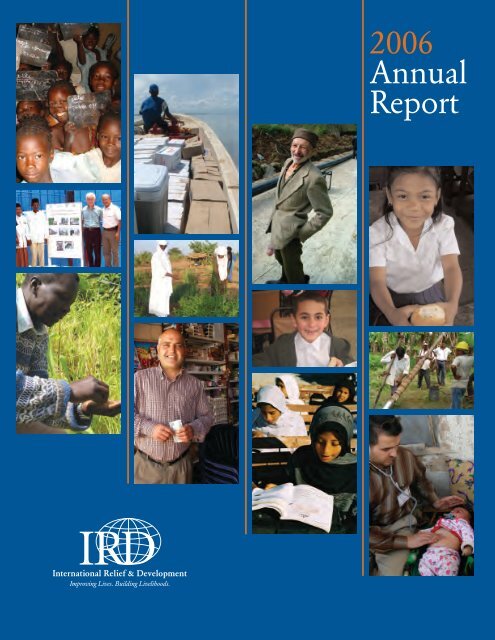
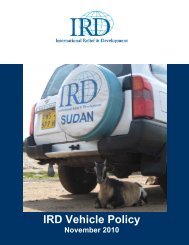
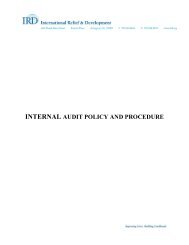
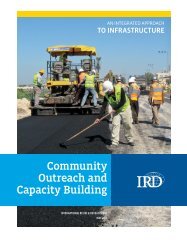
![Guide bonne pratique production d'oignon qualité_VF_4_2411012[1]](https://img.yumpu.com/23506639/1/184x260/guide-bonne-pratique-production-doignon-qualitac-vf-4-24110121.jpg?quality=85)
